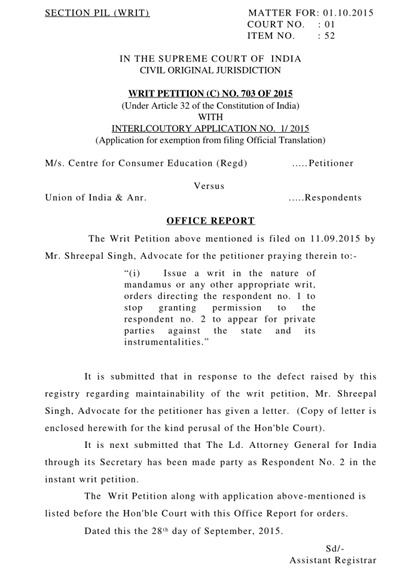
Should the Government of India be directed not to give permission to the Attorney General of India to appear for private parties against the state and its instrumentalities?
This is the question which a Supreme Court bench of Chief Justice HL Dattu and Justice Amitava Roy would be faced with, when a PIL seeking such a direction will be called for hearing before them today.
M/s Centre for Consumer Education, a registered private organisation has filed a PIL before the Supreme Court of India with Union of India and Attorney General of India as parties, which makes the following prayer:
Issue a writ in the nature of mandamus or any other appropriate writ, orders directing the respondent no. 1 to stop granting permission to the respondent no. 2 to appear for private parties against the state and its instrumentalities.
This PIL can probably be seen in light of the Kerala liquor ban case before the Supreme Court of India where Attorney General Mukul Rohatgi had represented one of the parties - Hotel Sky Pearl - not in his capacity as Attorney General but as a senior counsel appearing for a private party.
Rohatgi had appeared for his private client against the State of Kerala, in an appeal against the Kerala high court judgment upholding the new liquor policy of the state government which may lead to closure of all liquor bar hotels except those in the five- star classification.
As Legally India had reported earlier, this episode had created a controversy with an objection being raised during the court proceedings by an advocate appearing against AG’s client. Bench hearing the matter had however dismissed the objection saying that it is for the Central Government, which appointed the AG, to take a view on the matter. Later Wills Mathews, another advocate appearing in the case had filed an application for directions against AG which was however later withdrawn by him.
The Office of Attorney General
The Constitution of India under Article 76 (1) provides that the President of India shall appoint a person who is qualified to be appointed a Judge of the Supreme Court to be Attorney-General for India.
Article 76 (2) lays down as the duty of the person so appointed:
to give advice to the Government of India upon such legal matters, and to perform such other duties of a legal character, as may from time to time be referred or assigned to him by the President, and to discharge the functions conferred on him by or under this Constitution or any other law for the time being in force.
Under the above provision, Law Officer Conditions of Service Rules, 1987 (the “Rules”) have been issued which regulate the remuneration, duties and other terms and conditions of the Attorney-General for India, the Solicitor-General for India and the Additional Solicitor-General for India who are together known as the ‘Law Officers’.
Rule 8(1)(a) of the Rules restricts the law officers to hold briefs in any court for any party except the Government of India or the Government of a State or certain other Government bodies.
However, this is subject to Rule 10 which allows the Central Government to relax the aforesaid restriction by an order along with reasons, if it is of the opinion that “it is necessary or expedient so to do”.
Rule 10 was later amended in the year 2010 to include a proviso clause that rule 8 shall not be relaxed in relation to any matter where the Government of India or any Central Government instrumentality is or is likely to be affected.
Law Ministry does not appreciate the relaxation
In 2011, Ministry of Law and Justice stating that law officers are overburdening themselves with private litigation, issued an Office Memorandum to the effect that permission to law officers for their appearance in private cases will be granted only in the ‘rarest of rare’ occasions.
In 2012, the ministry claimed that in spite of the 2011 memorandum, exemption requests continued and hence it issued a fresh office memo stating that such permission would be granted only for compelling reasons and in very circumstances, with prior approval of ministry.
Mukul Rohatgi who was designated as senior counsel by Delhi High Court in the year 1993 was appointed as Attorney General of India w.e.f June 19, 2014.
On October 24, 2014, Ministry issued yet another OM reiterating its earlier position and requesting law officers to restrain from seeking permission to appear in private cases.
Was AG appearance for private party justified?
Though in the past several of the previous AGs like MC Setalvad, CK Daphtary and Soli Sorabjee have appeared for private parties while officiating the AG’s office, Rohatgi’s appearance for a private party has raised several eyebrows and the question whether there was a reason compelling enough to justify so.
Some of the criticism has been generated also in light of Article 47 of the Constitution which directs the State to endeavour to bring about prohibition of the consumption, except for medicinal purposes, of intoxicating drinks and of drugs which are injurious to health.
Thus it’ll be a topic of intense debate whether a law officer appointed under the Constitution of India may plead before a constitutional body against a directive of the Constitution.
threads most popular
thread most upvoted
comment newest
first oldest
first
threads most popular
thread most upvoted
comment newest
first oldest
first